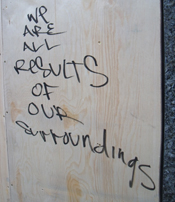Police fear a second wave of riots across England and are concerned they may not have the resources to cope. So suggests the Reading the Riots project in new analysis of the country’s 2011 unrest. A partnership between LSE (the London School of Economics) and the Guardian newspaper, the research project has turned its attention to the experience of police officers, victims and the courts for the second phase of its analysis of the disturbances.
Many police expect more rioting and feel they may not be equipped to cope find the project, whose academic head is Professor Tim Newburn from the LSE’s Department of Social Policy. However they also reported huge public support for their work and say their general strategy for containing the disorder was correct. The report’s main findings are:
Many officers from all ranks expect a repeat of the riots that spread across England last summer and are concerned they may not have the resources to cope with future unrest on such a scale.
In the hours and days after the disorder police in riot-affected areas reported unprecedented displays of support from members of the public, sometimes from people who were normally unfriendly. Many cited these gestures as their abiding memory of the riots.
The system of ‘mutual aid’ between forces failed to bolster the available resources at a critical time in the capital. The Met did not activate a national alarm system to call for more resources until the third and final day of riots in the capital. Once officers from other forces arrived, they were restricted by poor communication with central command.
Forces across England did not know how to respond to social media networks, particularly encrypted Blackberry Messaging, which enabled rioters and looters to organise and at times outmanoeuvre police. Control rooms were also swamped with intelligence from the internet and unable to sort rumour from fact on Twitter and Facebook, leading to mistakes when deploying resources.
However, police believe their general strategy in August, which focused on the protection of life and the use of the minimum force necessary to disperse crowds, was the correct approach, and almost certainly reduced the overall number of injuries and deaths. They also believe that relying on CCTV evidence as the basis for later arrests has been vindicated by the thousands of convictions for riot-related offences.
Police agree the Met was too slow in mobilising sufficient numbers of police in London and should have attempted to prevent looting more quickly. Police in Manchester, Birmingham and Liverpool, who had greater time to prepare and were faced with less extensive disorder, were able to deploy proportionately greater numbers of officers.
Officers were largely content with their equipment and training, and do not believe they need further powers to tackle rioters. One of the most common complaints from front-line officers was lack of food and water. Radio communications were also said by many police to have been overwhelmed by the sheer amount of communications.
Police all ranks were shocked and surprised by the extent and nature of violence directed at them, as well as the speed with which it escalated. Police generally believed that, should further riots occur, greater numbers of officers on the ground were far more important, and likely to be more effective, than introducing new water cannon or using plastic bullets.
Police across the country said there had been a shift in training and tactics introduced since the Met’s controversial handling of the G20 protests in London, which led to complaints of heavy-handed policing and the death of the newspaper-seller Ian Tomlinson. On the whole, officers supported the new, consent-based approach to public order policing.
Police of all ranks said they were astonished no colleagues were killed. Nearly all of the officers interviewed described the riots as the greatest physical and psychological challenge of their careers. Most remain deeply proud about the heroism shown by their colleagues.
Prof Newburn said: “August’s riots stretched the police service very seriously indeed. In terms of officer numbers, our research suggests the police outside London were largely able to cope – albeit only just, in many cases – but in the capital for three days there were simply too few resources.”
“The issue of police tactics is more complex, not least because tactics varied somewhat from force to force and area to area. In contrast to the considerable criticisms aimed at the Met, elsewhere our research found a real sense among police that their actions had been widely seen as both effective and largely understood.”
Commenting for the Association of Chief Police Officers was ACPO lead for Public Order and Public Safety, Chief Constable Ian Learmonth.
Ian Learmonth said: “The disorder that occurred in parts of England last August was unprecedented. The service has learned a number of lessons from that period. We are always striving to improve the policing service to the public, and how we police public order is no exception.
“There have been significant improvements already in terms of intelligence systems, tactics, training and deployment that strengthen our ability as a service to respond to large scale incidents of disorder and ensure we do our very best to protect life and property.
“I am enormously grateful for the overwhelming support the police service received from the public during that period of great difficulty, and for the selfless hard work of all the officers involved in policing the disorder as well as those involved in the subsequent investigation and prosecution of offenders.”









